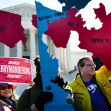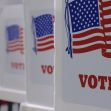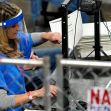Two Arizona laws were brought before the Supreme Court for oral argument to decide if they violate the Voting Rights Act. Those laws are 1) a bar against counting ballots that were cast at the wrong precinct, and 2) a prohibition on absentee ballots being collected by voter-turnout groups (a practice called “ballot harvesting.”)
Some requirements of the Voting Rights Act (VRA), enacted in 1965, came under fire eight years ago. At that time, the Supreme Court overturned a VRA requirement that said that if a state had a history of voter discrimination, they had to obtain federal pre-clearance before making any laws changing their election procedures.
The Arizona laws in question had previously been found to violate the VRA by the 9th U.S. Circuit Court of Appeals in San Francisco. The court declared the laws unconstitutional, reasoning that Native American and Hispanic voters regularly used third-party groups to deliver votes, and people of color vote out-of-precinct twice as often as other demographics.
Critics claim that the laws have been intentionally designed to suppress Black, Latino and Native American voters.
While the laws affect less than 1% of Arizona voters, the issue is not small to the parties in the case: the Democratic National Committee (DNC) and the Arizona Republican Party. The action has also made opponents of Katie Hobbs, Arizona’s secretary of state (Democrat) and Mark Brnovich, Arizona’s attorney general (Republican).
Brnovich said, “A lot of folks have said this case is one of the most important in front of the Supreme Court this term, and maybe the most important case, especially with elections the last decade.” He also said, “There is nothing in Arizona statutes that are designed to disenfranchise anyone.”
Justice Sonia Sotomayor disagreed, saying, “If you can’t vote because you are a Native American or a non-Hispanic in areas where car ownership rates are very small, where you don’t have mail pickup or mail delivery . . . or you happen to vote in a wrong precinct because your particular area has a confusion of precinct assignments, if you just can’t vote for those reasons and . . . your vote is not being counted, you’ve been denied the right to vote, haven’t you?”
Hobbs said, “The out of precinct law is pretty outdated. We have the technology available that voters don’t have to be tied to the precinct where they live.” That law was enacted in 1970. The law against collecting early ballots from voters was passed in 2016.
Hobbs went on to say that “Many legislators spent the months following the election helping to spread the misinformation and baseless allegations about fraud during the election and are now using that as justifications to present these bills to ‘restore’ that confidence of the voters, which they themselves help to undermine in their post-election actions.”
She also said, “During the pandemic, we were able to do a lot of innovative things that help voters show up, and we should be figuring out how we can institutionalize a lot of these things and not take us backwards.”
The Honest Elections Project, a “nonpartisan group devoted to supporting the right of every lawful voter to participate in free and honest elections,” said both parties’ voters want such things as “voter ID laws and vote trafficking bans,” and they claim that the precinct law helps officials keep track of voters. The regulations are “common-sense safety measures.” “These are widespread laws that are put in place for every good reasons. We need clear rules to allow for the smooth, efficient operation of elections.” This from Jason Snead, Honest Election Project’s executive director.
Democrats insist that the regulations, which suppress the votes of Hispanics and Native American voters in greater numbers than other ethnicities, could be construed as violations of the VRA. The Republican argument is that these laws are fine as long as minority voters had an equal opportunity to vote.
The Navajo Nation filed an amicus brief that states that members who live on the reservation are nearly 45 miles from the nearest post office. Only one in ten families own a car. In these circumstances, Navajos often ask others to deliver their mail for them. “These laws and policies either ignore or dismiss the unique challenges faced by Navajo voters,” the brief said.
The Ninth Circuit’s ruling found that minorities who live distant from polling places have difficulty returning their ballots in person. They specifically noted Native Americans in this regard.
Justice Elena Kagan asked whether a state could mandate that each county have only one polling place, despite population differences. “Is that system equally open in the language of the statute?”
Michael Carvin, an attorney for the Republicans, said no. He said, “If you have one polling place for five people and one polling place for five million people, obviously, in the latter situation, those people do not have an equal opportunity to vote.”
In response to other hypotheticals posed by Justice Kagan, Carvin opined that it would be permissible for a state to stop early voting for the two Sundays prior to Election Day, even though it is much more likely that Black voters will cast ballots on those two days.
He also said that a state could not put all its polling stations in country clubs a far distance from predominantly African-American neighborhoods, “because they have to travel further into hostile territory where minorities can travel one block.”
While saying that courts need to be mindful of that “sort of demographic realities,” he also said, “If a polling place was a foot farther away for minorities than for non-minorities, I don’t think anybody could argue that that really has a cognizable effect on opportunity.”
Carvin said, “We don’t think severe — or minor — disproportionate outcomes violate Section 2 . It’s not the outcome, it’s the opportunity.” “The question is not what’s wrong with it, the question is why a system that poses no unfairness on the group be changed simply because they find a different method of voting more convenient,” he continued.
Justice Amy Coney Barrett noted that the Democratic interest in doing away with the regulations was obvious, as they disproportionately burdened Democratic voters. She asked, though, what was in it for the Republican Party if the restrictions were enforced.
Carvin, citing Section 2 of the VRA (a provision that prevents a regulation that “results in a denial or abridgment of the right of any citizen of the United States to vote on account of race or color,”) said an unlawful interpretation of that section would hurt Republicans. He argued they would be “at a complete disadvantage relative to Democrats.” He argued that eliminating the regulations would make the “difference between winning an election 50 to 49 and losing.”
Chief Justice John Roberts had questions for the Democrats: “You say it doesn’t involve racial proportionality.” He said, “if the burdens were equally distributed among the races, that issue or that policy wouldn’t be before us, would it?”
Jessica Amunson, who represents the secretary of state, said, “Your honor, what I’m saying is that here what we have is a record that shows that Native Americans and Latinos in Arizona rely disproportionately on ballot collection and white voters do not. So that is why this is before you.”
Justice Samuel Alito said, “People who are poor and less well-educated on balance probably will find it more difficult to comply with just about every voting rule than do people who are more affluent and have had the benefit of more education.” He noted that the Democrats’ stance could open the floodgates to the possibility of change for large numbers of voting regulations.
Bruce Spiva, attorney for the DNC, reminded the court that a Virginia voter-identification law was upheld because the state provided free IDs to residents. He said, “More voting restrictions have been enacted over the last decade than at any point since the end of Jim Crow. The last three months have seen an ever greater uptick in proposed voting restrictions, many aimed squarely at the minority groups that Congress intended to protect.”
Looking for a compromise between the polarized positions, Justice Stephen Breyer thought the court could borrow the common catchphrase from other anti-discrimination laws. In cases where minorities are disproportionately affected, the regulations are upheld if there’s a “good non-race-related reason for doing this.”
Justice Brett Kavanaugh suggested, “One factor would be if you’re changing to a new rule that puts minorities in a worse position than they were under the old rule, and a second factor would be whether a rule is commonplace in other states that do not have a similar history of racial discrimination.”
The Brennan Center, a liberal group, claims that over 250 bills directed toward restricting voter access are in play in state legislatures across the country, after the 2020 election with its historic turnout and allegations of fraud.
Although it seems at present that both regulations will survive their airing before the Supreme Court, the justices seem dissatisfied with the “polar positions” of the opponents. A decision is expected in this case before July.






